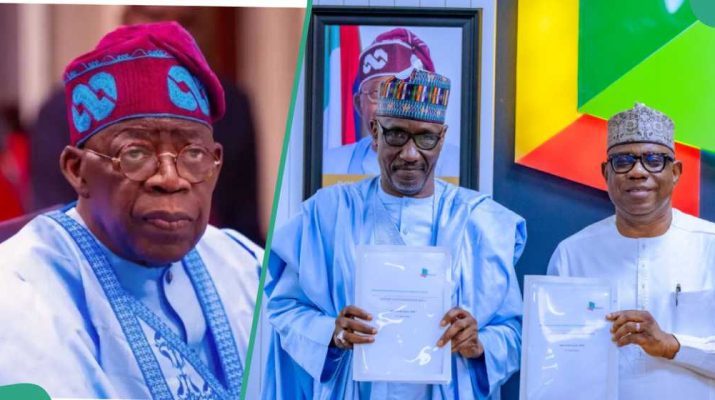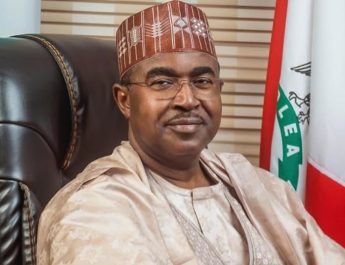In what has become evident of continued graft in Nigeria’s public sector, the Nigeria National Petroleum Company Limited (NNPCL) has again been allegedly enmeshed in corruption of unimaginable proportions amounting to N210 trillion, what with the repairs of dysfunctional refineries that have gulped over $25 billion and the involvement of Bayo Ojulari in an alleged $21 million financial scandal just four months after assuming office as Group Chief Executive Officer (GCEO)
By Edu Abade
Despite spending over $25 billion (or N37.5 trillion) on the repairs and turn around maintenance of Nigeria’s refineries in Port Harcourt, Kaduna and Warri, the refineries have largely remained dysfunctional.
To make matters worse, successive governments and even the present administration has treated the workability of the refineries with kid gloves and continued to import fuel, and only started buying fuel from the Dangote Refinery and Petrochemical Company, which was inaugurated in May 2023, but commenced operations in December.
Nigerians have awaited answers to the questions around the non-workability of the nation’s refineries and why the country continues to depend on importation of refined petroleum products in spite of being hugely blessed with crude oil and gas resources.
Sadly, Nigerians will have to wait for eternity to get the answers they seek. Reason: The government and those appointed to manage the oil and gas industry are more interested in plundering the resources for personal gains rather than salvage the situation for the common good of all.
Under the immediate past administration of late President Muhammadu Buhari, which saw the migration of NNPC to NNPCL, its erstwhile Group Managing Director and Chief Executive Officer, Mele Kyari, with the backing of the Buhari government’s cabal, ran the NNPCL like a private estate, allegedly siphoning trillions of naira into personal pockets. That era was nothing short of state plunder, according to oil and gas experts.
If the Buhari’s era was that of state plunder, analysts have argued that the Tinubu administration is proving to be a mere disaster in the oil and gas sector. Buhari had remained the substantive Minister for Petroleum Resources throughout his eight-year reign. The incumbent President Tinubu is towing the line of his immediate predecessor in holding tight to the oil and gas ministry also as the substantive Minister. Both cannot wash their hands off the monumental corruption that the NNPCL has become in the recent times. Besides hurriedly removing subsidy on his first day in office, Oando Plc, a company linked to Tinubu successfully acquired the Nigerian Agip Oil Company (NAOC) the same year following the divestments of the International Oil Companies’ (IOCs) assets from Nigeria.
Seplat Energy Plc also successfully acquired Mobil Producing Nigeria Unlimited (MNPU) assets in what Seplat had earlier described as a game changer for its operations, the most ridiculous of the onshore assets acquisition remains that of Renaissance Group takeover of Shell.
Tentacle reliably learnt that in a deal facilitated by Bayo Ojulari, Shell gave a $2 billion loan to Renaissance Africa Energy Company Limited to enable the company acquire the onshore assets of Shell Petroleum Development Company (SPDC) as Shell migrated offshore where it will be difficult to monitor its exploration activities.
Ojulari, a former Managing Director of Shell Nigeria Exploration and Production Company and founder of BAT Advisory & Energy, who advised Renaissance Africa Energy on its $2 billion takeover of SPDC, is the man President Tinubu appointed as GCEO of NNPCL in April 2025 to succeed Mele Kyari.
Only recently, Ojulari was reportedly disengaged as GCEO of NNPCL, but his rumoured sack or resignation was soon refuted by the authorities after another report linked him (Ojulari) with the presidency in a N210 trillion oil revenue scandal, prompting questions from Nigerians.
Ojulari’s alleged involvement between 2017 and 2023 oil sector theft under scrutiny, despite being appointed the GCEO of NNPCL only in April 2025 has sparked controversy over reports linking him and President Tinubu, but as facts continue to emerging amid glaring inconsistency even as Ojulari was not in charge during the period under review, he has been indicted in another $21 million fraud, which has been allegedly stashed away in the vaults of a close ally.
Reports also suggest sundry shady dealings involving the NNPCL and associates of former Vice President Atiku Abubakar, including his son-in-law, which has triggered intense reactions among Nigerians.
Reacting to reports claiming that Ojulari had resigned after being quizzed by the Economic and Financial Crimes Commission (EFCC), insiders maintain that while no official resignation has been tendered, “only a miracle will keep him in office at this stage.”
According to sources, President Tinubu, who appointed Ojulari just four months ago to replace Kyari, reportedly went “livid” over damning security reports detailing questionable financial dealings linked to the NNPCL boss.
Ojulari is said to be under investigation by the EFCC over alleged multimillion-dollar transfers to AA&R Investment Group, a company involved in energy, agribusiness, logistics and Information and Communication Technology (ICT).
Founder of AA&R and son-in-law of former Vice President, Atiku, Mr. Abdullahi Bashir-Haske, has been accused of orchestrating “large-scale money laundering through sophisticated financial structures.”
EFCC sources revealed that some transactions between NNPCL and AA&R were flagged as potentially illegal, raising concerns that the national oil firm may be indirectly “funding the opposition” through Bashir-Haske.
Bashir-Haske, who previously enjoyed extensive NNPCL patronage under its former GCEO Maikanti Baru (2016-2019), reportedly fell out of favour with Kyari, who succeeded Baru, but was reinstated by Ojulari in April 2025.
Upon his appointment, Ojulari allegedly restored privileges to Bashir-Haske, raising political concerns given Atiku’s position as a leading presidential hopeful under the African Democratic Congress (ADC), likely to challenge Tinubu in 2027.
Presidency sources described Tinubu’s reaction as one of “betrayal and rage,” saying the president views Ojulari’s actions as “sleeping with the enemy.”
“The president is livid with rage. He sees this as a stab in the back. A form of soft landing will be provided for Ojulari to exit, as removing him now seems to be too early in the day. What Ojulari has been doing amounts to sleeping with the enemy,” a source said.
However, following the developments, critics are questioning how Ojulari could be tied to a financial scandal spanning 2017 to 2023-years before his appointment. The tenure in question falls squarely within Kyari, who served as GCEO from 2019 to April 2025.
This time difference has sparked speculations that Ojulari may be a convenient scapegoat, with many Nigerians demanding to know, “Where is Mele Kyari and his Kanuri boss?” Others argue that the real architects of the alleged theft remain untouched, while new faces are being dragged into the mud.
While the Presidency has yet to officially respond, watchdog groups are calling for a full-scale forensic audit of NNPCL’s finances, stressing that accountability should not be sacrificed on the altar of political protection. The alleged ₦210 trillion theft-roughly equivalent to half of Nigeria’s entire GDP-has added urgency to the calls for transparency in the oil and gas sector.
With public trust already strained, Nigerians now await a clear and credible explanation: Who truly oversaw the multi trillion-naira discrepancies-and who is being shielded?
In all, due to its vested interests in the oil and gas industry, oil and gas experts still argued that the Federal Government should be held accountable for the sale of onshore assets of SPDC to Renaissance Africa Energy Company Limited, Oando’s takeover of NAOC and Seplat’s acquisition of MPNU, among other local oil and gas consortiums.
Renaissance had in a statement that explained that the approval, which was reportedly given by the Minister of State for Petroleum Resources, Heineken Lokpobiri marked a significant step forward from the announcement of the sale and purchase agreements in January”.
Shell’s $5bn investment in the Bonga North project was instrumental in persuading the government to approve the sale of the onshore asset which was initially agreed at $1.3 billion.
Tentacle learnt that the sale was previously blocked by the Nigerian Upstream Petroleum Regulatory Commission (NUPRC) in October, even though both SPDC and the Renaissance had reached an agreement in January.
The assets are said to hold an estimated 6.73 billion barrels of oil and condensate, along with 56.27 trillion cubic feet of associated and non-associated gas.
NUPRC’s CEO, Gbenga Komolafe said the commission rejected the deal because it “could not scale (the) regulatory test”
There are also concerns about numerous lawsuits and allegations hanging over Shell Nigeria over human rights abuses and environmental degradation in the Niger Delta region.
NUPRC said it would only grant approval for the sale if Shell takes responsibility for oil spills and agrees to fund cleanup efforts in the Niger Delta.
Shell Plc reached an agreement to sell its Nigerian onshore oil assets to Renaissance Group, a local consortium. Renaissance Group is a conglomerate of local oil companies including ND Western Limited, Aradel Holdings Plc, Petrolin Group, FIRST Exploration and Petroleum Development Co. and Waltersmith Group.
The deal was blocked by the upstream regulatory agency, NUPRC in October 2024. NUPRC said it wanted Shell to show responsibility for oil spills that harmed lives and the environment and commit to cleanup efforts.
Oil companies, including Shell, Total Energy and Eni have almost concluded divesting offshore operations and leaving onshore operations to avoid dealing with local communities who bear the cost of oil spills and environmental damages. These companies also had to confront oil theft and pipeline vandalism in what promises to be the continuing plunder of oil and gas resources with the connivance of the government and its cronies in high places.
Why The Refineries Can’t Work
It remains a mystery how Nigeria, with its vast oil and gas deposits, has survived importing fuel with billions of dollars. As a certified engineer with one of the electricity generating companies (GenCos), who craved anonymity puts it, “Nothing can be done to achieve steady power supply in the country because the powerful politicians in and out of government who have amassed so much wealth from state plunder are the ones controlling generator importation and solar business.
“And so, if there is constant electricity supply, their businesses will be in jeopardy. The same goes for the oil and gas sector, anything that will be done to achieve stability in the system must be frustrated to safeguard their interests and so that their investments and businesses remain intact. You can’t change anything, at least for now.”
That statement is instructive and explains why the corruption and rot in the two critical sectors will continue for a long time. How can one explain that after spending $25 billion to fix the nation’s refineries, they still remain comatose?
In the past decade, fixing the country’s three moribund refineries has remained a mirage to the extent that the Ninth national in its report, called for a forensic audit of the refineries.
Earlier, the House of Representatives lamented that despite the huge amounts spent to rehabilitate the refineries they were producing at less than 30 percent capacity, and have even shut down again.
The report followed NNPCL’s continued increase following President Tinubu’s complete removal of fuel subsidies, maintaining that a slow economic growth, high public debts, double-digit inflation and insecurity challenges.
The cost of repairing Nigeria’s refineries has been a subject of significant debate and scrutiny and while the NNPCL has reported spending billions of dollars on maintenance and repairs, the refineries have consistently struggled with low output and operational issues.
Details of total spending on the refineries indicate that Nigeria has spent over $25 billion on refinery repairs in the last decade, with some estimates reaching as high as $3.7 billion for specific projects.
Despite the massive expenditure, the refineries have not achieved consistent or significant production levels, with some operating at less than 30 percent capacity.
The NNPCL has carried out Turnaround Maintenance (TAM) on the refineries, but these efforts have been criticized for lack of transparency and questionable results and due to the persistent problems and high costs, there are growing calls for the privatization of the refineries.
Recent reports suggest that the Port Harcourt refinery, despite a $1.5 billion overhaul, has been shut down again due to operational challenges. Similarly, the Warri refinery, after a $897.6 million rehabilitation, has also faced shutdowns.
Even during periods when the refineries are not processing crude oil, they continue to incur operational expenses, leading to further losses.
This, most Nigerians suspect, is to pave the way for their complete sale and takeover by the same corrupt leaders in their quest to plunder and totally annex the country’s vast resources. Nigerians are watching!



